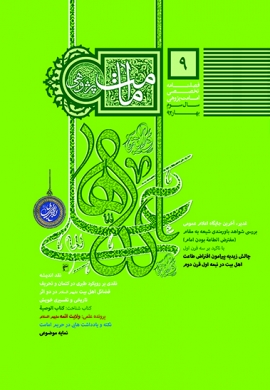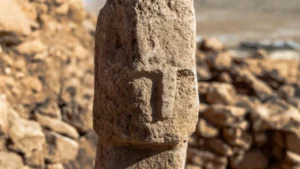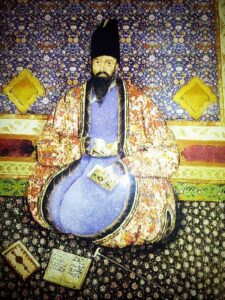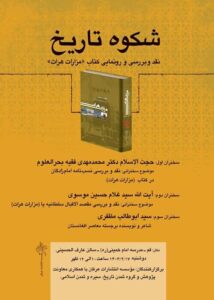
فصلنامۀ امامت پژوهی در فصل نهم خود به بار نشست و مطالب ذیل را از امامت پژوهان، در اختیارعلاقه مندان گذاشت. این شماره در هفت بخش تدوین شده است که عناوین مقالات و چکیده آنها به شرح ذیل است:
الف) مقالات:
1. غدیر آخرین جایگاه اعلام عمومى جانشینی امیر المؤمنین (علیه السلام) – آیه الله سید علی حسینی میلانی:
چکیده :غدیر یادآور امامت امیرمؤمنان علی(علیه السلام) و انتصاب رسمی ایشان بر این مقام والاست. امامت عهد و پیمانی بسان نبوت است و به دست خدای متعال بوده و هیچ کس بدان مقام نایل نمی گردد، مگر اینکه او اراده کند.
پیامبر خدا(صلی الله علیه وآله) از آغازین روز رسالت خویش در هر فرصت و موقعیت و در میان هر گروه و جماعت مردم را به امامت امیرمؤمنان علی(علیه السلام) فرا می خواند و با عبارات و کلمات گوناگون آن را به امت خویش می رساند؛ تا اینکه در غدیر هر آنچه را که به صورت پراکنده دربارۀ امامت و ولایت علی(علیه السلام) فرموده بود، در یک مجلس بیان کرد.
این نوشتار مراحل اعلام جانشینی امیر المؤمنین(علیه السلام) را از آغاز بعثت در شش مرحله بر شمرده، و غدیر را آخرین جایگاه اعلام عمومی جانشینی آن حضرت میداند. سپس با نقل واقعۀ غدیر، به بیان خطبه و معانی واژۀ «مولی» و دلالت آن بر امامت امیر المؤمنین میپردازد و در ادامه به تشکیکها و ایرادهای برخی از اهل سنت، پاسخ می دهد.
2. بررسی شواهد تاریخی باورمندی شیعه به مقام «مفترض الطاعه بودن امام»،(با تأکید بر سه قرن اوّل) – محمدعلی دزفولی:
چکیده :اندیشۀ اطاعت محض از امام، از باورهایی است که شیعه از ابتدا بدان معتقد بوده، و آن را در مقاطع مختلفی تاریخی به شکلهای گوناگون بروز داده است. شواهدی که از تاریخ ظهور امامت در جامعه حکایت میکند، گویای این مطلب است که ماهیت فرمان برداری از امام در هر دورۀ زمانی از حیات ائمه در اذهان شیعیان رسوخ داشته و امری انکار ناپذیر است. حتی انحرافاتی که از مکتب تشیع دیده میشود در جوهر این باور نیست؛ بلکه در یافتن مصادیقی است که باید از ایشان فرمان برد و مطیع محض آنها بود. از این رو، سرگذشت، رواج و ارائه این عقیده در شیعه ـ بنابر اقتضائات اجتماعی و سلطه حاکمان ـ با فراز و نشیبهایی مواجه بوده است به طوری که تنها در نوع بروز این باور تفاوت دیده میشود و نه در اصل آن ـ که مورد پذیرش شیعه و تأیید ائمه بوده است. کاوش شواهدی که به تقویت این مدعا یاری میرساند، بر دوش این نوشتار است.
3. چالش زیدیه پیرامون افتراض طاعت اهل بیت در نیمه اوّل قرن دوم – سید عبد الحمید ابطحی:
چکیده :زید و فرزندش یحیی به علم ائمه معترف بودند؛ ولی برخی شواهد نشان میدهد که ولایت و افتراض طاعت الهی برای ایشان نمیشناختند. خلف ایشان از جریان بنی الحسن علاوه بر انکار ولایت الهی اهل بیت نسبت به الهی بودن علم ائمه نیز موضع انکاری داشتند. شواهد نشان میدهد در نیمه اوّل قرن دوم مرز پیروان اهل بیت از جریان زیدیها علاوه بر عقیده به الهی بودن ولایت اهل بیت، از طریق موضع گیری نسبت به شیخین نیز آشکار میشده است و لذا زیدیهای کوفه در اظهار تولی نسبت به شیخین اصرار داشتهاند؛ به این معنا که حقی از علی را ضایع نکرده بودند. بر اساس برخی شواهد ابوالخطاب در قبال تقصیر این طایفه در کوفه به تبری از شیخین و اعلام تولی نسبت به امام صادق اقدام کرده بوده است و به تدریج در این زمینه به افراط گرایید.
ب) پرونده علمی:
1. گونههای ولایت تشریعی امامان(علیهمالسلام) در روایات، پژوهشی در خصوص مبانی تفسیر شیعه امامیه و تکامل آن – هادی صادقی؛ محمد رکّعی:
چکیده :ولایت امامان دارای دو بعد تکوین و تشریع است. هر کدام از این دو بعد را میتوان با رویکردهای عقلی، نقلی و تاریخی بررسی کرد. نوشتار حاضر مسألۀ «ولایت تشریعی امامان» را با رویکرد روایی در حوزۀ گونههای ولایت تشریعی مورد بررسی قرار میدهد. محورهای این پژوهش عبارتند از: ولایت بر تشریع یا تفویض تشریع به امامان، ولایت تفسیری یا مرجعیت علمی و دینی، ولایت اجتماعی یا رهبری و سرپرستی جامعه. متون روایی در تمامی این محورها، ولایت تشریعی را برای ائمه ثابت میدانند و در نهایت این اصل را اثبات میکنند که امامان جز در رسالت و نبوت در تمامی شؤون مربوط به ولایت با پیامبر مشترکند.
2. گسترۀ ولایت تکوینی اهل بیت (علیهم السلام) در اصول کافی و بصائرالدرجات – غلامرضا شاه رجبیان:
چکیده :ولایت تکوینی، شأنی از شؤون اهل بیت (علیهم السلام) است که در حدود و گسترۀ آن، اختلاف است؛ از این رو، بعضی از راویان و محدثانی که روایات حاکی از کرامتهای اهل بیت (علیهم السلام) را نقل میکردهاند، متهم به غلو شدهاند. در این تحقیق، به بررسی دامنۀ این موضوع، در دو منبع از منابع کهن روایی شیعه، اصول کافی و بصائرالدرجات، پرداخته شده است.
از مقایسۀ گسترۀ ولایت تکوینی اهل بیت (علیهم السلام) در این دو کتاب، روشن میشود که ولایت ایشان حوزههای متعددی را شامل میشود. صفار، روایات مربوط به حوزههایی مانند: زنده کردن مردگان، طی الأرض، و شفای بیماران را به طور گسترده آورده و برای غالب آنها، عنوان باب مستقل قرار داده است؛ ولی مرحوم کلینی، در اصول کافی، اگر چه از قریب به اتفاق این حوزهها، روایت نقل کرده، اما برای غالب آنها، عنوان باب مستقل، قرار نداده، و برای هر حوزهای نیز، روایات کمتری را نسبت به استادشان (صفار) نقل کرده است.
3. تفویض تشریع به معصومان (علیهم السلام) در رویکرد عالمان امامی – مهدی سفری، محمد کرمانی کجور:
چکیده :اصطلاح تفویض، گاه به معنایی در مقابل جبر و گاه به معنای واگذاری دستكم پارهای امور به انسانی والا از سوی خداوند میباشد. اصطلاح دوم به دو گونه كلان تکوینی و تشریعی طبقه بندی میگردد؛ و اینكه خداوند جعل حکمی شرعی و کلی را به معصوم و یا معصومانی، سپرده باشد بیآنکه وحی یا الهام خاصی در خصوص آن حکم رسیده باشد، گونهای متصور از تفویض در فضای تشریع است که ولایت تشریعی و گاه ولایت بر تشریع نیز خوانده شده است. در این نوشتار این معنا در ساحت رویکردهای عالمان امامی، مورد بررسی قرار گرفته و این نتیجه به دست آمده که در مجموع رویکرد عالمان امامی بدان، سه نظریه را سامان داده که هر یک طرفداران برجستهای داشته و در دو دسته نظریه اختصاص و نظریه اشتراک قابل طبقهبندی است. نظریه اختصاص تشریع به خداوند که مبتنی بر نفی هر گونه تفویض تشریعی است بر مستندهای قرآنی استوار است و به نظر میرسد نظریۀ اشتراک، که بر عدم تنافی خود با مستندهای قرآنی نظریه اختصاص پای میفشرد، نظریه غالب در جامعه علمی امامی باشد. این نظریه که از منظر گسترۀ دو گونه حداقلی و حداکثری دارد، گونه حداقلی آن، تفویض تشریعی را تنها در پیامبر (صلی الله علیه وآله) پذیرفته و بر مستندهای روایی استوار است و گونه حداکثری آن، از اشتراك پیامبر و امامان(علیهم السلام) با خداوند سخن گفته و با منهجی روایی و نیز اصولی، از آن دفاع مینماید.
4. تفویض دین، نزاعی حقیقی یا لفظی – مرتضی علیزاده نجار:
چکیده :تفویض امر دین به پیامبر (صلی الله علیه وآله) و امامان(علیهم السلام) از بحثانگیزترین مسائلی است که از دیرباز معرکۀ آراء میان عالمان و اندیشمندان قرار گرفته و موافقان و مخالفان با طرح مستندات عقلی و نقلی به دفاع از مدعای خود پرداختهاند. تبیین درست محل نزاع به پژوهشگران این عرصه کمک میکند تا علاوه بر هموار شدن بخشی از مسیر تحقیق، آشنایی دقیقتری با موضوع پیدا کنند و در مقام نفی یا اثبات دچار خطا و اشتباه نشوند. در این نوشتار میکوشیم با تنقیح و توضیح محدوده بحث در تفویض دین، نقطه کور اختلاف علماء را بررسی کنیم و در همین راستا به اشکالهایی که اصل نزاع را باطل دانسته و با توجیه لفظی بودن نزاع، نظریه اثبات حق تشریع برای پیامبر و ائمه را منکر شدهاند پاسخ دهیم تا در نهایت بدانیم که بسیاری از علماء معتقد به تفویض امر دین به معنای حق تشریع بودهاند و هنوز جای بحث علمی دقیق در این مسأله وجود دارد.
5. ولایت در سنت اسلامی – مریا مسى داكیك:
ترجمه: گروه بررسى مطالعات امامتپژوهى در غرب انگلیسى زبان
این نوشتار ترجمۀ فصل اول كتاب «ولایت در سنت اسلامى(Walayah in the Islamic Tradition)» است.
ج) نقد و اندیشه:
نقـدی بر رویکرد طبـری در کتمان و تحریف فضائل اهل بیت در دو اثر تاریخی و تفسیری خویش – مرتضی فرجپور
چکیده :ابوجعفر محمد بن جریر طبری مورخ و مفسر مشهور قرن سوم و از علمای عامه است. در این مقاله بخشی از شواهد روشن اعتماد او به راویان غیر معتمد از سویی و کتمان و تحریف وقایع تاریخی از سوی دیگر به همراه برخی از کاستیهای محتوایی و عقیدتی، در دو اثر تاریخی و تفسیری وی (تاریخ الأمم و الملوک و جامع البیان عن تأویل آی القرآن)، مرور میشود. در ضمن به معرفی شخصیت و عقاید خاص طبری نیز خواهیم پرداخت.
د) کتاب شناخت:
کتاب الوصیه ابوموسی بجلی – عبدالحسین طالعی
این نوشتار به معرفی کتاب الوصیه، روایه عیسی بن المستفاد، ابی موسی البجلّی الضریر، (متوفای 220) می پردازد. اصل این کتاب در دسترس نیست؛ اما منقولاتی از آن در کتابهای معتبر شیعی موجود است. محقق کتاب، آقای قیس عطار، آن را بر اساس 36 حدیث منقول در کتابهای کافی، صراط مستقیم و …. بازسازی و چاپ کرده است.
ﻫ) نکته ها:
در این بخش مطالبی با موضوعات زیر می خوانیم:
نقش آگاهی از مورد صدور حدیث در فهم حدیث؛ مرتضی فرجپور
پاره هایی از دو کتاب قدیمی (نزهه السامع و کتاب السقیفۀ ابو صالح السلیل) در کتاب غرر الاخبار دیلمی؛ عباسعلی مردی
سیری در عیون المناظرات ابو علی عمر سکونی (م 717)؛ عبد الحسین طالعی
نگاهی به «امین شریعت» کتابی دربارۀ علامه امینی و اثری تازه چاپ از او المقاصد العلیه؛ حسین علیزاده
خطبۀ نبوی پس از نزول آیۀ ولایت در غدیر خم؛ عبد الحسین طالعی
نکات قابل نقد در تفسیر تاج التراجم؛ عبد الحسین طالعی
فلسفۀ غیبت حضرت ولی عصر در مروری بر خلاصه النظر. حسن اسدی( تبریزی)
و) نمایه فصلنامه امامت پژوهی (شماره 5-9)؛ نجمه باقریان
ز) چکیده های انگلیسی؛ حسین احمدوند
Ghadir as the Last Place of Public Announcement of Vicegerency of Amir al-Mumenin (AS) – Ayatollah Sayyed Ali Hosseini Milani :
Abstract :Ghadir is the reminder of Imamate of Amir al-Mumenin Ali (AS) and his official appointment to this office. Like prophethood, Imamate is also a heavenly covenant signed by the Lord and no one would be honored to this title unless His Majesty has already willed it.
From the earliest days of his prophecy, Prophet Muhammad (SAW) always did take the occasion to recall the people both communally and individually to the Imamate of His Holiness Ali (AS) and communicated this Divine Message to his nation in various phrases and words; until in Ghadir the Prophet (SAW) expressed all he had stated about the Imamate and Welayat of Ali (AS) here and there in one assembly.
This essay discusses of sextuple stages of announcement of vicegerency of Imam Ali (AS) and regards Ghadir as the last one of these stages of public announcement of Vicegerency of His Holiness. Having related the Ghadir occasion, the essay turns to the phraseology of Ghadir Sermon particularly the term "Maula" and its application to Imam Ali (AS) and then answers some doubts casted by Sunnite scholars.
An Assessment of Historical Evidences of Shiite Belief in "Obligatory Obeyance from Imam" (A Case Study of Early Three Centuries) – Mohammad Ali Dezfuli :
The idea of passive obedience from Imam is among the beliefs that Shiite has always been attached to since the earliest days on, and has divulged it through different historical periods in various forms. The evidences that bespeak of the history of emergence of Imamate in Muslim society show that the belief in obedience from Imam had invariably dominated Shiite minds throughout all Shiite Imams Imamate. Even the deviations seen from Shiism are not related to the essence of this belief; rather they are concerned with extensions of application of this belief. Thus, this idea has been exposed to various vicissitudes due to socio-political circumstances that have led to its various divulgences while it remains intact in its essence. This essay seeks to substantiate this latter claim through available evidences.
Zeydiyyah's Challenge Concerning the Necessity of Obeyance from Prophet's Household in the first half of Second Century – Sayyed Abdulhamid Abtahi
Abstract :Zeyd and his son both did acknowledge the primordial knowledge of Imams (AS); however some evidences demonstrate that they did not believe in canonical necessity of obedience from Their Holinesses. Their successor from Bani al-Hassan descent besides denying divine Welayat of Prophet's Household did also renounce the belief in divinity of Imam's knowledge. The evidences show that during the first half of second century the followers of Prophet's Household were distinguished from Zeydis not only through their belief in the divinity of Welayat of Prophet Muhammad's descendents but also by their stances toward Sheikheyn as the Zeydis of Kufah insistently showed their adherence to Sheikheyn; this adherence was a witness to their belief that Sheikheyn did not violated Ali's right. According to some evidences, to reciprocate the fault of these people of Kufah, Abulkhatab renounced any adherence to the Sheikheyn and revealed his loyalty to Imam al-Sadegh (AS) and gradually he began to tread the path of extremism.
Scientific File :
The Varieties of Legislative Welayat of Imams (AS) in Prophetic Traditions
A Study of the Exegetical Principles of Imamyah Shiite and Its Evolution – Hadi Sadeghi and – Mohammad Rakkeii :
Abstract :The Welayat of Holy Imams has two dimensions – i.e. generation and legislation. Each one of these aspects can be examined via rational, traditional and historical approaches. The present essay studies the issue of "legislative Welayat of Imams (AS)" through a tradition-based approach in the domain of varieties of legislative Welayat. This article is concentrated on the following categories: Welayat to legislation or conferment of legislation to Imams, exegetical Welayat or scientific and religious authority, social Welayat or leadership of society. Traditional texts have proven the legislative Welayat of Prophet's Household in all these cases and eventually they demonstrate that Imams have the same status as that of Prophet Mohammad (SAW) in all affairs of Welayat but prophecy.
The Scope of Generic Welayat of Prophet's Household (AS) in Usul al-Kafi and Basaer al-Darajat :
Abstract :Generic Welayat is an existential aspect of Prophet's Household (AS) the scope of which is a matter of dispute among scholars. Thus some traditionists who had narrated Imams' dignities and divine gifts were accused of exaggeration. This research is an attempt to evaluate this issue in the light of two ancient Shiite tradition books, i.e. Usul al-Kafi and Basaer al-Darajat.
By comparing the scope of generic Welayat of Prophet's Household (AS) in these books it becomes clear that their Welayat encompasses various domains. Safar has broadly narrated the traditions pertaining such categories as reviving the dead, earth traveling in a moment, healing the ills and the like and in most cases set an independent chapter for each one; but Kuleini, in Usul al-Kafi, although he has related traditions concerning almost all of these domains, however as compared to his master, neither has he opened an independent chapter for them nor did he relate traditions as much as the master.
The Conferment of Legislation upon Immaculate Imams According to Imamyah Scholars -Mahdi Safari and Mohammad Kermani Kajur :
Abstract :The term 'conferment' is sometimes used in a sense counter to arbitration and sometimes it implies the assignment of at least some affairs to a noble man by God. The latter sense of the term is being classified in two general forms of generic and legislative. Conferment in legislative sense means that the Lord has assigned the institution of some judicial and public laws to Immaculate Imams without being preceded by any revelation or inspiration. This is called Welayat to legislation or legislative Welayat. This essay has examined this sense of conferment according to Imamyah point of view and concluded that Imamyah approach has given rise to three theories in this regard each one of which has its own proponents and can be categorized in two groups of theories respectively insist on the commonality of legislation and those that see the latter an specificity of Divine Essence. Both theories ground themselves in Quranic documentations; however, it seems that the theory of commonality represents the dominant view of scientific community of Imamyah. This theory is of two kinds in respect of its scope, i.e. minimal and maximal, the former one of which insists on legislative conferment as a specific gift of the Prophet while the latter regards it as a common gift of the Prophet and Imams and both defend their stances with verses of Quran and prophetic traditions.
Conferment of ReligionA True or Verbal debate -Morteza Alizadeh Najjar :
Abstract :The conferment of religious affairs to prophet and Imams is among the controversial issues that has been the battle ground of scholars and theologians since the early days of Islam on and the proponents and opponents have substantiated their views through rational and traditional documents. The exposition of issue helps the scholars to have a clear view of the debate and not to be trammeled in intellectual impasses in their positive or negative arguments. In doing so, we seek to tile the path for a better understanding of the issue and the Gordian knot that has preoccupied scholars for a while and to challenge those who has regarded this issue a verbal dispute and denied the right of legislation of Prophet and Imams. Finally we are to prove that this is a dynamic debate between scholars and needs to be demarcated in a more precise manner.
Walayah in the Islamic Tradition – Marya Messi Dokick :
Translated by
Commission for the Assessment of Western Studies of Imamate
English Group
This is a Persian translation of a chapter of the following book: The Charismatic Community: Shi'ite Identity in Early Islam.
Criticism and Thought :
A Criticism of Tabari's Misrepresentation and Denial of the Merits of Prophet's Household in his Two Historical and Exegetical Books :
Abstract :Abu Mohammad Ibni Jurayri Tabari is a renowned historian and exegete of the third century and a public scholar. This essay seeks to offer an overview of his distortions and misrepresentations and his frequent reference to unreliable narrators in his renowned exegetical and historical books, i.e. Jami ul-Bayan An Tawili Ayat al-Quran and Tarikh al-Umam wa al-Muluk. At the same time the reader shall be provided with an introduction of the personality and ideas of Tabari.
Bibliology :
Al-Wasyah by Abu Musa Bajli -AbdulHossein Talei :
This essay is a review of Al-Wasyah by Isa Ibni al-Mustafad Abi Musa al-Bajli (died in 220 H.). The original version of this book is not available to us but there are some quotations from it in authorized Shiite books. The editor of the book has reconstructed and published it based 36 traditions quoted from it in such books as Kafi, Sirat al-Mustaqim and the like.
Tips :
We read the following themes in this part :
The role of awareness of occasion of tradition in the understanding of tradition; excerpts from two ancient books (Nuzhat ul-Samei and Al-Saqifah by Abu Salih al-Salis) taken from Ghurar ul-Akhbar al-Deylami. A review of Uyun al-Munazirat by Abu Ali Omar Skuni (died in 717 H.); A review of "The Guardian of Shariah" a new book on Allamah Amini and a newly published work by him entitled Al-Maqasid al-Elleyah; Prophetic Sermon after the revelation of Welayat verse in Ghadiri Khum; Criticizable points in Taj ul-Tarajim; The philosophy of occultation of His Holiness Mahdi Sahib al-Zaman through a cursory view of Khulasat ul-Nazar.
منبع: وب سایت بنیاد فرهنگی امامت.








